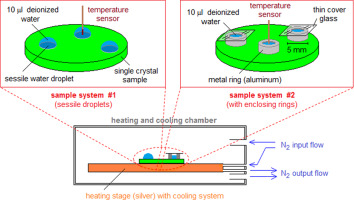In our experiments, the icing temperature of small water volumes placed on different pyroelectric single crystals (SrxBa1-’xNb2O6, LiNbO3, and LiTaO3) was determined using two measurement setups: (1) the sessile droplet and (2) ring system method. In the first method, a free-standing water droplet was exposed to several external factors in the air environment. This was found to lead to higher icing temperatures compared to the second method where the water was more isolated from external factors such as evaporation. In the second method, the material of the ring system was found to be an important factor determining the freezing temperature of the enclosed water. A recommendation for the application of both methods is given, their advantages and disadvantages depending on the purpose of measurement, and their reproducibility for practical applications. In addition to this, the correlation between pyroelectricity and icing temperature, with regard to several types of internal and external factors affecting water freezing, is also discussed in the paper.

In our experiments, the icing temperature of small water volumes placed on different pyroelectric single crystals (SrxBa1-’xNb2O6, LiNbO3, and LiTaO3) was determined using two measurement setups: (1) the sessile droplet and (2) ring system method. In the first method, a free-standing water droplet was exposed to several external factors in the air environment. This was found to lead to higher icing temperatures compared to the second method where the water was more isolated from external factors such as evaporation. In the second method, the material of the ring system was found to be an important factor determining the freezing temperature of the enclosed water. A recommendation for the application of both methods is given, their advantages and disadvantages depending on the purpose of measurement, and their reproducibility for practical applications. In addition to this, the correlation between pyroelectricity and icing temperature, with regard to several types of internal and external factors affecting water freezing, is also discussed in the paper.
